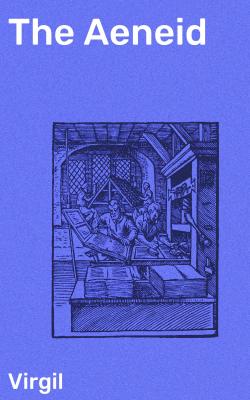The Aeneid. Публий Марон Вергилий
Читать онлайн.| Название | The Aeneid |
|---|---|
| Автор произведения | Публий Марон Вергилий |
| Жанр | Языкознание |
| Серия | |
| Издательство | Языкознание |
| Год выпуска | 0 |
| isbn | 4057664188922 |
Then to their fellows they unbar the gate.
“ ’Twas in the dead of night, when sleep repairs
Our bodies worn with toils, our minds with cares,
When Hector’s ghost before my sight appears:
A bloody shroud he seem’d, and bath’d in tears;
Such as he was, when, by Pelides slain,
Thessalian coursers dragg’d him o’er the plain.
Swoln were his feet, as when the thongs were thrust
Thro’ the bor’d holes; his body black with dust;
Unlike that Hector who return’d from toils
Of war, triumphant, in Aeacian spoils,
Or him who made the fainting Greeks retire,
And launch’d against their navy Phrygian fire.
His hair and beard stood stiffen’d with his gore;
And all the wounds he for his country bore
Now stream’d afresh, and with new purple ran.
I wept to see the visionary man,
And, while my trance continued, thus began:
‘O light of Trojans, and support of Troy,
Thy father’s champion, and thy country’s joy!
O, long expected by thy friends! from whence
Art thou so late return’d for our defence?
Do we behold thee, wearied as we are
With length of labours, and with toils of war?
After so many fun’rals of thy own
Art thou restor’d to thy declining town?
But say, what wounds are these? What new disgrace
Deforms the manly features of thy face?’
“To this the spectre no reply did frame,
But answer’d to the cause for which he came,
And, groaning from the bottom of his breast,
This warning in these mournful words express’d:
‘O goddess-born! escape, by timely flight,
The flames and horrors of this fatal night.
The foes already have possess’d the wall;
Troy nods from high, and totters to her fall.
Enough is paid to Priam’s royal name,
More than enough to duty and to fame.
If by a mortal hand my father’s throne
Could be defended, ’twas by mine alone.
Now Troy to thee commends her future state,
And gives her gods companions of thy fate:
From their assistance walls expect,
Which, wand’ring long, at last thou shalt erect.’
He said, and brought me, from their blest abodes,
The venerable statues of the gods,
With ancient Vesta from the sacred choir,
The wreaths and relics of th’ immortal fire.
“Now peals of shouts come thund’ring from afar,
Cries, threats, and loud laments, and mingled war:
The noise approaches, tho’ our palace stood
Aloof from streets, encompass’d with a wood.
Louder, and yet more loud, I hear th’ alarms
Of human cries distinct, and clashing arms.
Fear broke my slumbers; I no longer stay,
But mount the terrace, thence the town survey,
And hearken what the frightful sounds convey.
Thus, when a flood of fire by wind is borne,
Crackling it rolls, and mows the standing corn;
Or deluges, descending on the plains,
Sweep o’er the yellow year, destroy the pains
Of lab’ring oxen and the peasant’s gains;
Unroot the forest oaks, and bear away
Flocks, folds, and trees, and undistinguish’d prey:
The shepherd climbs the cliff, and sees from far
The wasteful ravage of the wat’ry war.
Then Hector’s faith was manifestly clear’d,
And Grecian frauds in open light appear’d.
The palace of Deiphobus ascends
In smoky flames, and catches on his friends.
Ucalegon burns next: the seas are bright
With splendour not their own, and shine with Trojan light.
New clamours and new clangours now arise,
The sound of trumpets mix’d with fighting cries.
With frenzy seiz’d, I run to meet th’ alarms,
Resolv’d on death, resolv’d to die in arms,
But first to gather friends, with them t’ oppose
If fortune favour’d, and repel the foes;
Spurr’d by my courage, by my country fir’d,
With sense of honour and revenge inspir’d.
“Pantheus, Apollo’s priest, a sacred name,
Had scap’d the Grecian swords, and pass’d the flame:
With relics loaden, to my doors he fled,
And by the hand his tender grandson led.
‘What hope, O Pantheus? whither can we run?
Where make a stand? and what may yet be done?’
Scarce had I said, when Pantheus, with a groan:
‘Troy is no more, and Ilium was a town!
The fatal day, th’ appointed hour, is come,
When wrathful Jove’s irrevocable doom
Transfers the Trojan state to Grecian hands.
The fire consumes the town, the foe commands;
And armed hosts, an unexpected force,
Break from the bowels of the fatal horse.
Within the gates, proud Sinon throws about
The flames; and foes for entrance press without,
With thousand others, whom I fear to name,
More than from Argos or Mycenae came.
To sev’ral posts their parties they divide;
Some block the narrow streets, some scour the wide:
The bold they kill, th’ unwary they surprise;
Who fights finds death, and death finds him who flies.
The warders of the gate but scarce maintain
Th’ unequal combat, and resist in vain.’
“I heard; and Heav’n, that well-born souls inspires,
Prompts me thro’ lifted swords and rising fires
To run where clashing arms and clamour calls,
And rush undaunted to defend the walls.
Ripheus and Iph’itas by my side engage,
For valour one renown’d,
